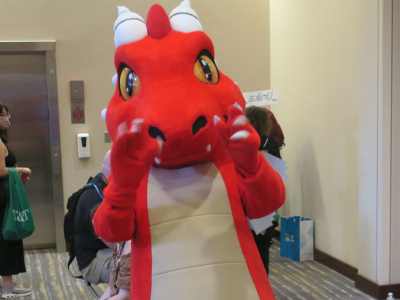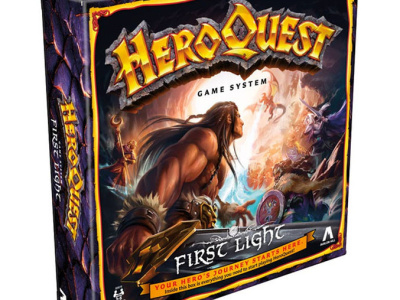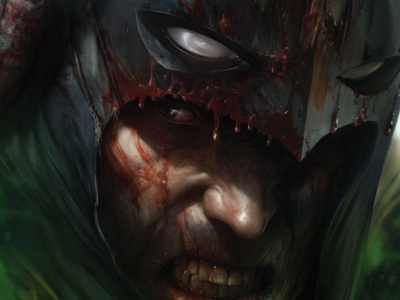 ICv2 met with DC’s new Co-Publishers, Jim Lee and Dan Didio, at San Diego Comic-Con last month in our annual conversation about the state of the market and DC’s place in it. In Part 1 of this three part interview, we talk about the state of the market in comic stores, bookstores, digital, mass merchants, and the closing of the CMX imprint. In Part 2, we talked about DC’s media tie-ins this year and next, the beginnings of the changes at DC since its management changes, and the co-publisher arrangement between Lee and Didio. And in Part 3, we talked about how DC’s now working with other DC divisions, a possible move of the DC offices to
ICv2 met with DC’s new Co-Publishers, Jim Lee and Dan Didio, at San Diego Comic-Con last month in our annual conversation about the state of the market and DC’s place in it. In Part 1 of this three part interview, we talk about the state of the market in comic stores, bookstores, digital, mass merchants, and the closing of the CMX imprint. In Part 2, we talked about DC’s media tie-ins this year and next, the beginnings of the changes at DC since its management changes, and the co-publisher arrangement between Lee and Didio. And in Part 3, we talked about how DC’s now working with other DC divisions, a possible move of the DC offices to
How do you see the state of the market right now for comics in general and DC Comics in particular?
Lee: I think the core market place remains very stable and strong. That’s been really good. We had some recent hits with some of the anniversary issues of Superman and Wonder Woman.
Speaking on behalf of the digital side of things I really feel that we’re at a pivotal point in which we’re going to be opening up this digital channel. We have high hopes for what that can be. We’re in our third week of that and it’s been pretty impressive so far so we’re looking to see more. We’re looking to bring new readers into the marketplace and so far the preliminary data has shown that we are reaching new eyeballs or we’re reaching lapsed fans that we weren’t reaching before.
Didio: One of the things we see, this is going to sound like a negative but it’s actually a positive is that the market is kind of flat right now. Given that it’s a recessionary time the fact that we don’t see any sort of decline that you would see in other areas, that’s a good thing for us. And the dollars are staying in the business. We’re at a point right now where we see such a wide variety in pricing.
We had some levels of concern in the bookstore business as we see some of the brick and mortar businesses being challenged by online sales and things like that. From our standpoint the fact that everything is remaining flat and we’ve actually had some levels of growth in some of our new books that we’ve launched (we’ve had over a dozen sell-outs in the last three months), that’s a great thing because it shows that even though there’s a level of concern or hesitance on the retailer side on ordering in, the fans are there and they want to buy it.
The second printings for us have been extraordinarily strong. That shows a lot of support and interest in our books.
One of the things that we’re just finding out today which I’m very happy to hear is that we’ve had extraordinarily strong sales on Blackest Night in the hard covers that have come out. We’ve put a large volume of Blackest Night tie-ins. We were a little worried that we might have put out too much product but the key books are actually breaking out bigger than we even imagined. The sales are even stronger than we thought, not only in the direct market but also in the book store market as well.
What about the book store market? You alluded to that. Can you contrast that in terms of relative strength versus the comic store market? Our observation is that it’s softer than the comic store market. Is that fair?
Lee: I think it’s softer because there’s been a bit of implosion in the manga side of things. That saw a tremendous increase in sales and I think the mass market bookstores are paying for the party now. Also in terms of Watchmen, that was such a huge high for us. There’s nowhere to go but down I guess. It’s hard to compare yourself to the height we achieved with the Watchmen. That said I think it’s an adjustment and we still see it as a very strong category for us.
Didio: Exactly. And there was a point where we were expecting the book store market to probably overtake the direct market in the volume of sales that we were doing. But now we’ve got a nice balance between the two and the direct market still remains strong for us and that’s a good thing because you always have a good base to work from.
There was mention of a wide variety of pricing. On our site there’s been some concern from retailers recently about the creep in prices going up, a higher percentage of the line going to $3.99. What’s the future direction and what’s your response to the concern?
Didio: Only 25% of our line is over $2.99. For the amount of books that we put out, the amount of product we have out there, to be over $2.99 for just 25% I think is a good, strong indication of how we’re dedicated to try to keep the prices down. In the 4th quarter we’re going to be doing a number of reprint books at a higher price but I wouldn’t compare them to the periodicals. I say a “halfway trade” in order to get more product in the market that people are looking for and find ways to do it. We’re trying to hold the price as much as possible.
The reality is though if it’s a book that people want they’re willing; they seem price insensitive to it. They’re willing to pay the higher price for books that they want. They seem to be a little more cautious about the books that are higher priced that they’re on the fence about. We’re well aware of that. Our goal is to hold the prices as low as possible. We don’t see our line getting to the point where our competition is at where so much of their line right now is higher than a $2.99 price point.
Jim, you mentioned digital and DC obviously came out with a bang. Maybe you could talk a little bit about what you see as the role of the digital channels going forward and how that fits into the brick and mortar.
Lee: I think presently it’s more of a marketing opportunity than a straight sales opportunity. Right now the free comics that we have are being downloaded on a six to one ratio more than the pay ones. We have a tremendous amount of interest in the previews that we have for the Wonder Woman #600 and Superman #700. We’re also seeing a lot of titles that haven’t done well in the direct market, things that are tied to TV shows or to videogames, do very well for us, comparatively much better in the digital channel than in the print channel. I think that speaks to reaching new eyeballs, people from sort of ancillary marketplaces, that have similar demographics but they’re not necessarily into comics right now. As we pull those guys in we are going to see some more foot traffic in the brick and mortar store. I think it’s incumbent upon us to close that loop tighter and figure out more direct ways of enticing these new readers to find brick and mortar stores. That’s something we’ve been meeting retailers on. We’ve already had two meetings with a bunch of key retailers and talked to them about ways we could implement this, and we’ve gotten a lot of good feedback from them.
We haven’t really talked about mass merchants. Any change in DC’s presence in mass merchants in the last year?
Didio: The presence that we have on the newsstand is nearly negligible at this period in time, and it’s something that needs to be reevaluated. There are a lot of interesting opportunities that keep on coming across the table. A lot of large chains always seem to want to gamble on the idea of putting comics out on the periodical basis as a way to help spike their sales and eat up space that they might be losing from other material disappearing. We’ve met with them. We continue to meet with them. We’re looking at different formats and ways to present to them. Our hope is that maybe by next year we’ll have some sort of strong strategy to be able to get a foothold in that marketplace once again.
You mentioned the decline in manga. DC recently closed its CMX imprint. I wonder if you’d maybe reflect a little bit on that arc over the last five to ten years of growth in manga and now the shrinkage, and on why DC decided to pull out now.
Lee: We had put in a number of good years trying to make a real concerted effort to be in that business. It’s difficult because the licenses, the key licenses, are not easy to obtain. It’s a very long negotiating process where you have to work with lesser-known titles and work your way up to the key licenses. That hurt us from the get-go. We had great staff, and Asako Suzuki was instrumental in spearheading the CMX line. I think we had some relative success given the licenses we had. But if you look at what’s shaking out in the market right now, from what I can tell, it’s just a very few, very dominant licenses that account for the bulk of the business and everything else has fallen to the wayside.
We looked at a number of different alternatives. We talked to a number of key publishers there about alternatives and then we couldn’t make the numbers work. The numbers on CMX were, comparatively, super low compared to the rest of our offerings and just reached a point where it made more sense for us to be out of the business than to continue struggling with it.
Do you know what’s going to happen to those licenses?
Lee: We’ve actually had interest from a couple of other creative studios that were interested in taking over the role on a couple of books. We’re talking to them. Right now I assume they’re going to revert back to the publishers and they’ll figure it out. I think Dark Horse had expressed interest…
There are some incomplete runs.
Lee: Exactly.
Click here for Part 2 of the interview.







